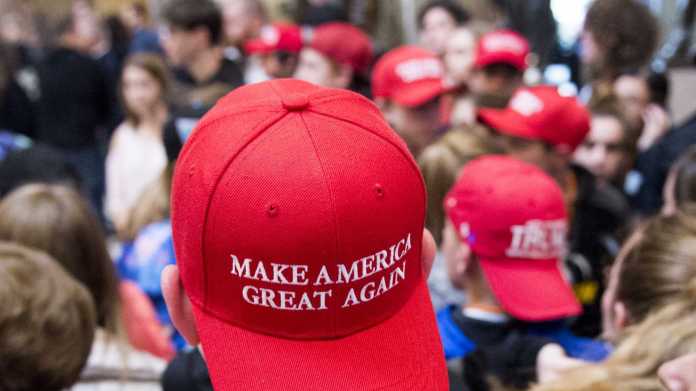Last Saturday,
thousands of supporters of the outgoing American president, many of
them wearing silly uniforms and waving ridiculous banners and flags,
converged on Freedom Plaza in Washington, D.C. for the ambitiously
named Million MAGA March. After a rally, they walked to the Supreme
Court and ended the day with speeches from the likes of ‘former’
Qanon believer and incoming Georgia congresswoman, Marjorie Taylor
Greene.
The presence of a
smaller number of counter demonstrators along the way almost
guaranteed there would be scuffles and, in the end, there were at
least 20 arrests for a variety of offenses, including assaults and
violations of local gun laws. Several stabbings also that occurred that night.
Although some videos
of the events of the day were deceptively edited by far right
provocateurs like Andy Ngo to make the counter protesters look like
the violent ones, footage of ‘Proud Boys’ and others stealing signs from elderly
people, shoving and punching those exercising the same 1st
Amendment rights they often claim to defend and attacking
journalists, muted the usual arguments that ‘both sides do it’.
Just as in
Charlottesville, Berkeley and Portland over the last four years, the bullying right were not
the victims they so often try to portray themselves as.
It does at present
seem that these often highly confrontational Trump supporters will at
some point have to accept the results of the November 3rd
election, regardless of their hurt feelings. With court cases
challenging the results in a number of states being struck down and
even ridiculed by the lower courts, the only way to change the outcome
seems to be a constitutional coup with GOP controlled states choosing
to ignore the results in President elect Biden’s favor and sending
pro-Trump electors to the Electoral College, overriding the will of
the people.
Barring the type of crisis that would be provoked by such a betrayal, now may be a good time to look ahead and try to figure out what the outgoing president’s loss will mean for Trumpism as a political movement and which others might try to take up the mantle of the right-wing populism he rode to triumph in the 2016 U.S. elections.
First, there is the possibility that Trump himself or one of his family members will run in 2024. While the former idea has been floated since a Biden victory became increasingly likely in the days after the election, his niece, Mary Trump, a clinical psychologist who released a tell all book earlier this year, said in an interview with CNN’s Chris Cuomo that another run after losing is unlikely because her uncle wouldn’t be able to accept a second such failure, “He can keep telling everyone that he really won the 2020 election and it was stolen from him by fraud (and he will, ad nauseam), but the prospect of yet another loss would be too frightening.”
His eldest daughter,
Ivanka, who has been working in the White House throughout his
administration could conceivably test the political waters in the
years ahead, but, aside from using public speeches to praise her
father, doesn’t really seem to have a knack for providing his base
with the kind of self pitying, racist red meat that garnered the
failed real estate developer such a cult like following.
Better at this kind
of messaging and seemingly adored by the MAGA crowd is Don Jr., a
child of obvious privilege like his father before him, who has become
adept at stoking the grievances of the mainly white middle class
voters who make up the Trump base and uses social media more
creatively than his father. Besides a seeming indifference to actual
policy on par with Trump Sr., also working against Trump Jr. in terms
of winning over the all important Republican donor class is that his
public appearances are often almost comically hyperactive, leading
some to question whether he’s using some kind of stimulant.
Just as his father
does, Don Jr. tries to project conjectures like these back onto
perceived enemies, telling Fox & Friends that those wondering
about his mannerisms after his unhinged speech at the Republican
convention on August 24th, “…have me confused with Hunter Biden.”
Barring a family led
legacy, what other options are now being quietly forwarded to the
MAGA crowd by a Republican Party desperate to hold onto Trump voters
on the road to 2024?
One rhetorical
difference between the outgoing president’s populism and the more
traditional conservatism of the Republican Party, at least until
2016, is the way it draws on vaguely left wing sounding appeals to
working people. Trump’s excoriation of ‘the Establishment’,
especially in media, and his attacks on trade deals supported by most
of his own party and the Democratic opposition could probably be
overheard at a Bernie Sanders rally during either of the last two
Democratic primaries. One big difference was that these arguments
were deployed alongside somewhat contradictory calls to national
pride central to the MAGA brand, creating a potent mix that helped
him win more than 73 million votes on November 3rd.
Rhetorical outreach
to working people aside, point by point, if we look at the
accomplishments of the outgoing administration, besides historic
court packing, there’s very little besides rhetoric to separate his
record from those of earlier Republican presidents.
Further, we’ve
seen that almost half of Republicans support Medicare for All but
still voted for Trump in 2020, perhaps believing his repeated promises of a much better plan for all
his fellow citizens that has never materialized. Instead his
administration has tried to use the Supreme Court to overturn the
whole of the Affordable Care Act which, flawed as it is, offers some
protection to the country’s most vulnerable, including those with
preexisting medical conditions.
Almost unremarked
upon in the press, which has been preoccupied with the election and
raging pandemic, one of the outgoing president’s opponents in the
2016 primary, ‘little’ Marco Rubio, has begun to try to portray
himself as a populist. The Florida senator has been making these
themes more coherent in recent months, telling Alayna Treene ofAxios, “The future of the [Republican] party is based on a
multiethnic, multiracial working class coalition.” and that,
“…the free market exists to serve our people. Our people don’t
exist to serve the free market.”
Going
against Republican orthodoxy, in
a move that he will probably try to use to establish his bonafides
as a champion of the working class, it
was Rubio,
“who actually worked with Democrats to create a payroll support
program that temporarily saved millions of jobs over the summer.”
The problem for
Florida senator may be that he simply looks and talks too much like a
standard politician for this strategy to work as it did for an
outsider like Trump or, even more likely, that he’ll be
overshadowed by others who have been assiduously building these
arguments for years, like Fox News’ Tucker Carlson.
Carlson, one of the
few Fox opinion personalities who occasionally criticizes the outgoing president, has been rumored to be considering his own run in
2024 and poses as an anti-corporatist conservative on the network
every weeknight despite being the heir to a frozen food fortune and
relying on many of the same corporate interests he claims to oppose
to advertise on his show.
Only time will tell,
but there’s one potential 2024 candidate who really manages to
bridge the worlds of Trump’s populism and traditional
Republicanism: Arkansas Senator Tom Cotton. Cotton, a veteran of his
country’s wars in Iraq and Afghanistan, ticks a lot of boxes for
both groups.
As Steve Bannon told the New Yorker in 2017, in regards to the Arkansas senator, “How many guys in town can give a speech at the Council on Foreign Relations and also get kudos in the pages of Breitbart? The answer is, one guy.”
Cotton,
more than most of his Senate
colleagues has also gone
further in terms of echoing
the outgoing president’s
calls for a ‘law and order’ approach to protests
like those that followed the police killings of George Floyd and
Breonna Taylor. He
even called in a June
opinion piece in the New York Times for the military to be deployed
to the streets of many of the country’s cities to quell the
Black Lives Matter protests that followed their deaths.
“One thing above all else will restore order to our streets: an overwhelming show of force to disperse, detain and ultimately deter lawbreakers,” he wrote in the piece, that caused an uproar at the paper of record leading to the resignation of the opinion page editor.
Other contenders might include Ted Cruz and Josh Hawley, but these senators may rely too much on religious conservatives who really have nowhere else to go regardless of who wins the party’s nomination in 2024.
If nothing else, it should now be clear to American progressives that Trumpism in some form is likely to remain a factor in American politics for some time. Effectively countering populist economic arguments from the right (who don’t really believe them) will be key to growing the progressive movement and keeping any heir to Trumpism from reaching the nation’s highest office where a more competent person than the outgoing president could do even more damage in the United States and abroad.
Related posts:
Views: 0
 RSS Feed
RSS Feed

















 November 21st, 2020
November 21st, 2020  Awake Goy
Awake Goy 






 Posted in
Posted in  Tags:
Tags: 
















